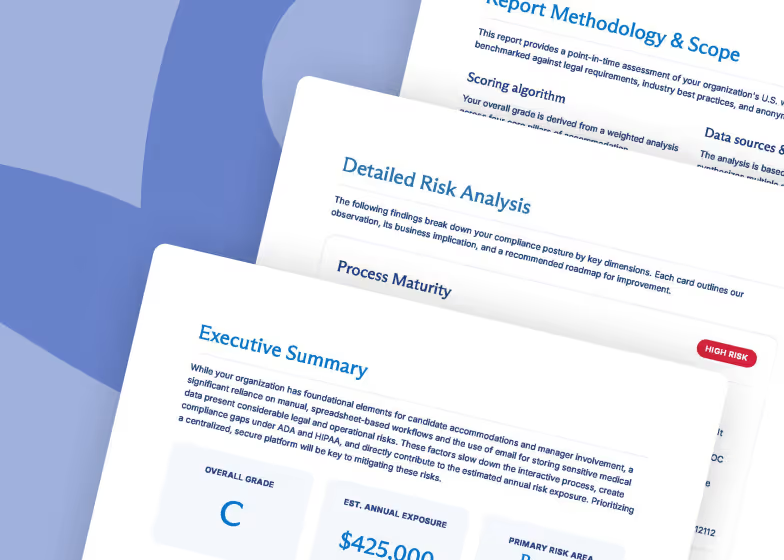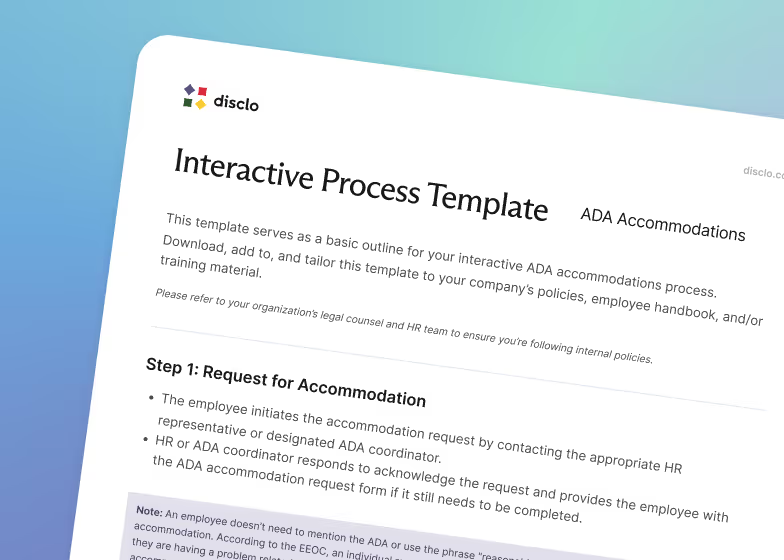

Primary Kids is a children's clothing company focused on simple, high-quality essentials. Founded with inclusivity as a core value, the company serves families nationwide with thoughtfully designed clothing that grows with kids.
This customer story features insights from Jodie Cenci, Primary’s Director of HR.



Primary Kids’ Director of HR Jodie Cenci thought she had workplace accommodations figured out. As a “full soup to nuts HR generalist,” she handled everything people-related for the growing team. Her accommodations program was simple: employees could just talk to her.
The problem? In her first two years at Primary, no one ever did.
“Before Disclo, our program was essentially just ‘talk to me,’ assuming that people even knew that that was an option,” Jodie explains. “At that point, no one had approached me for accommodations. So it didn't necessarily feel like we had a problem, which in retrospect, I now know was a sign of a problem."
For someone with more than a dozen years in HR, this didn’t add up. In fact, throughout her entire career, Jodie had never received a single accommodation request. She knew this couldn’t mean her workplaces simply didn't employ people with disabilities, or that those who had disabilities didn’t need additional support to do their jobs.
Everything changed when Jodie developed fibromyalgia and suddenly found herself needing workplace accommodations. As a team of one in HR, she couldn't exactly go to herself for help.
The experience was intimidating and vulnerable. Jodie had to approach Primary's co-founders and CEO—the same people who evaluated her performance—to discuss her medical needs and request support.
“After feeling how vulnerable it was to have to share all of this information with the same people who rate my performance, that's how I knew that there was a problem,” Jodie reflects.
The realization hit hard: if she, an experienced HR professional, found the process scary and didn't know what to do, how must other employees feel?
Less than a week after Jodie's difficult conversation with her managers, a message from Disclo landed in her inbox. The timing couldn't have been more fortuitous.
“When I saw Disclo, it kind of felt like it had been pulled right out of my brain and all of these racing thoughts that I had been having for the last couple of weeks,” she says. “It was exactly what I wished that I had had going through the process.”
Jodie hadn't budgeted for an accommodations vendor—she hadn't even known software like Disclo existed. But her personal experience made her passionate about finding a solution.
“I didn't have any plan for it. I didn't have a budget for it,” she admits. “But it was something that I was very immediately so passionate about that I knew that I would find a way to find the money. I was so in love with it, I was ready to honestly just pull out my checkbook and pay for it myself.”
Jodie approached leadership with her proposal and they were immediately bought in.




The impact was instant and exactly what Jodie had hoped for: people started requesting accommodations.
Within the first few months, four or five requests came in—significant for a 60-person company. Most were simple items like an ergonomic mouse or a more supportive chair.
One employee specifically mentioned how easy the process was, noting that “before they knew it, they had this piece of equipment show up at their house. And that was the end of it.”
But the impact went beyond equipment requests. Employees began having open conversations about their needs, even if they didn't require formal accommodations. The program became a catalyst for broader discussions about disability inclusion throughout the employee lifecycle—from recruiting to performance management to company events.
Primary's brand value of inclusivity found new expression through their accommodations program. Jodie began incorporating disability inclusion into hiring manager training, ensuring evaluation criteria focused on job competencies rather than traits that could be attributed to disabilities or neurodivergence.
The program also influenced how Primary plans company events. For their annual summer outing, where remote employees gather in person, accommodation information is prominently featured in communications.
“I've gotten specific feedback that has been appreciated," Jodie notes. "Knowing that we are thinking about all of these different pieces of programming in this way has really just emphasized that inclusivity isn't just in how we design and brand our clothing... but it's something that’s infused into every part of our business.”
For Jodie personally, having an accommodations program provided both validation and peace of mind. The simple $35 ergonomic mouse she had been “truly terrified” to request became a symbol of how small accommodations can make a big difference.
Beyond her own experience, knowing support is available for her team brings comfort: “Even if we never got another request again, just knowing that it's available for team members should they need it gives me a lot of comfort.”
Jodie's experience reveals several critical insights about workplace accommodations:

When no one requests accommodations, it often indicates a process problem, not a lack of employees with disabilities.

Even HR professionals can find accommodation requests intimidating when they lack clear processes and guidance.

Simple, inexpensive items can dramatically improve an employee's work experience.

Sometimes it takes walking in your employees' shoes to understand what they truly need.

Employees need to know what they can request and how to request it before they'll feel comfortable asking for help.
Today, Primary Kids has transformed from a company with zero accommodation requests to one where employees feel empowered to ask for what they need. The program has become integral to their culture of inclusivity, affecting everything from hiring practices to event planning.
“Accommodations really can make an impact on somebody when they're going through something tough and scary,” Jodie concludes. “I just love that we make that accessible for people.”
Sometimes the best solutions come from leaders who have experienced the problem firsthand. At Primary Kids, Jodie's personal journey with accommodations didn't just solve her own challenge—it opened doors for every other employee too.

Your company may be at risk of costly legal action due to non-compliance. Discover your accommodations compliance risk today.


Outdated systems put you at risk. Check out the resources to learn how you can stay compliant, operate efficiently, and effectively support your employees.


Use this basic outline to kick-start the interactive ADA accommodations process. Customize it to your business as needed.
